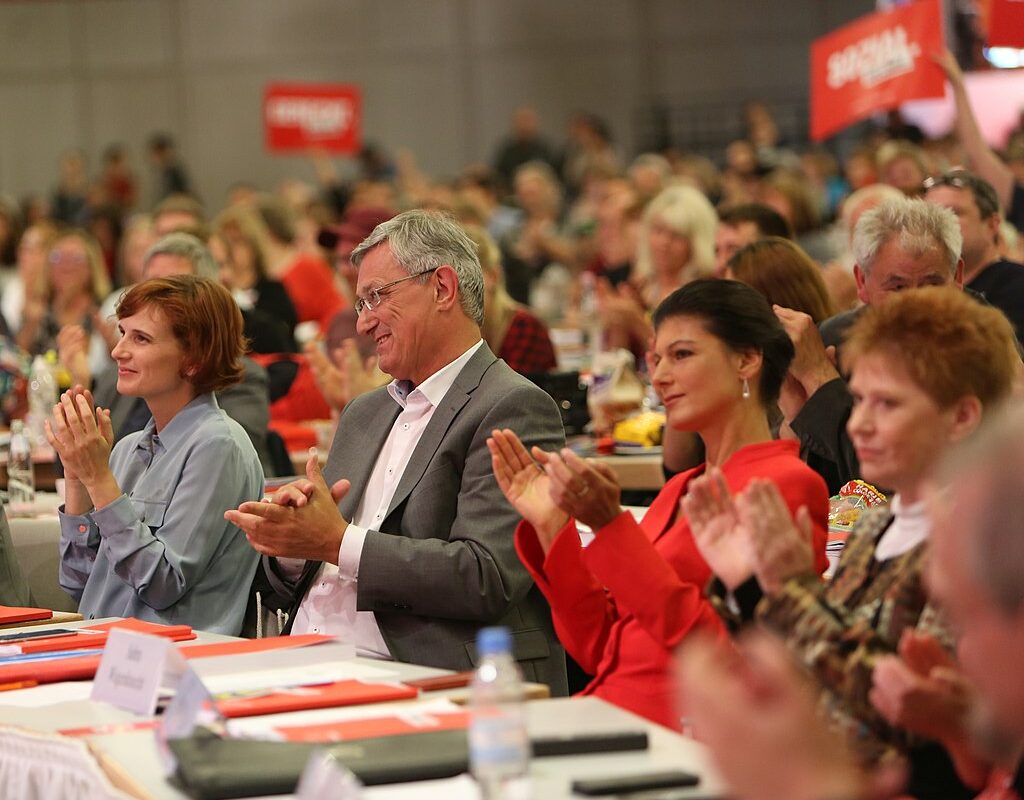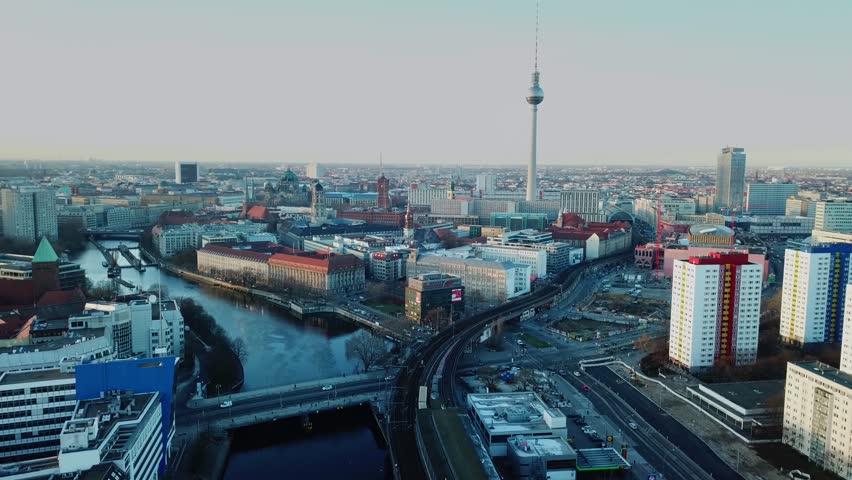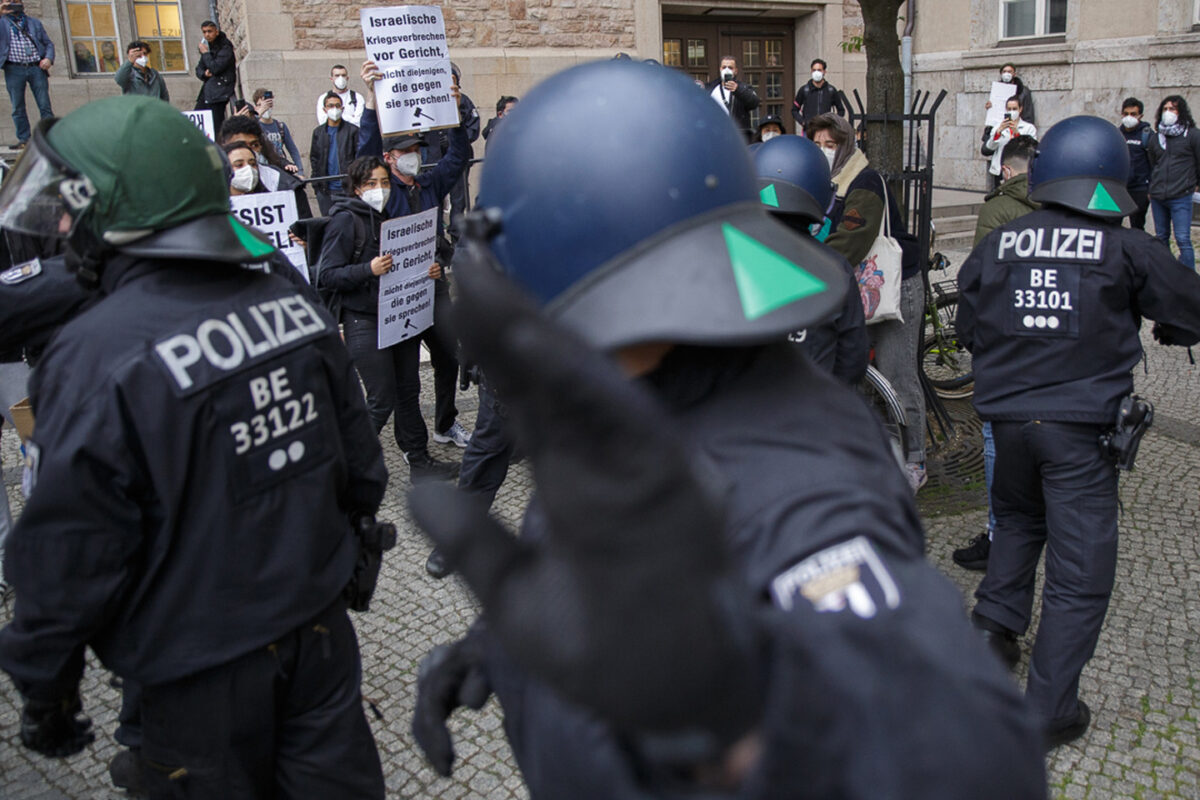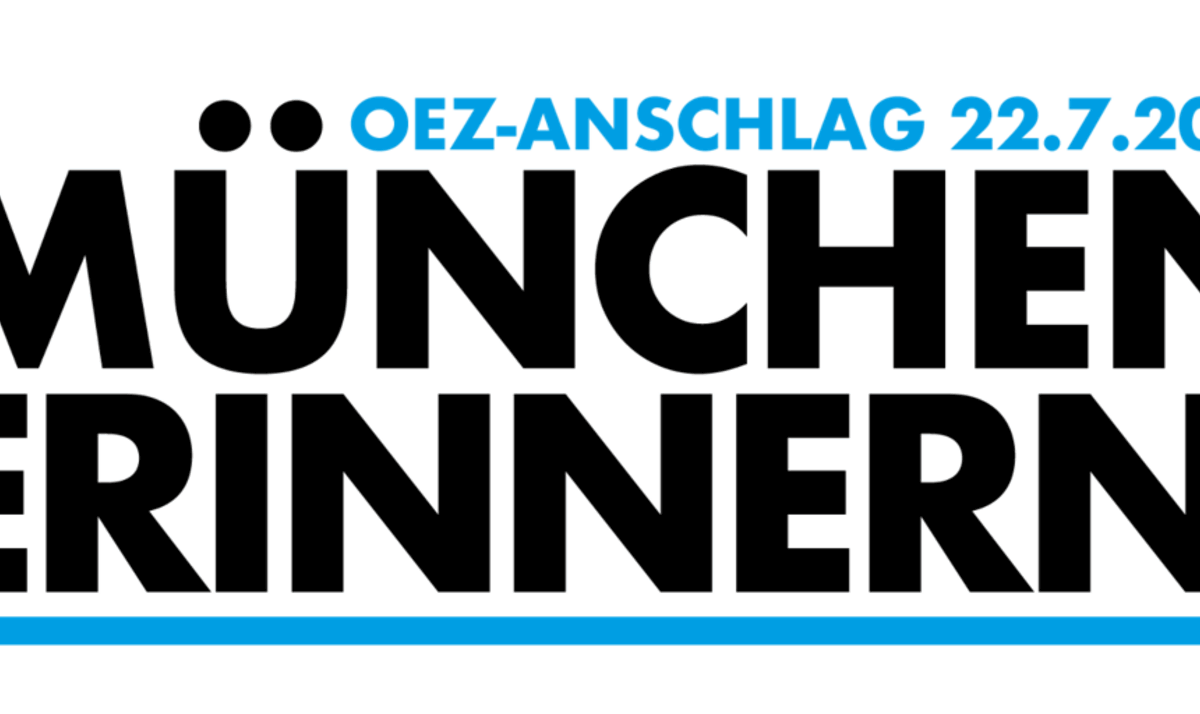European elections are less than a week away — the first vote in Germany since the split in Die Linke. In October of last year, Sahra Wagenknecht and nine other MPs resigned from the Party and launched a competing formation: the Sahra Wagenknecht Alliance (BSW). At the moment, polls vary wildly, making it impossible to say whether Die Linke or the BSW have more support. Since Germany has a 5% threshold to enter the national parliament, but no such threshold for EU elections, it is conceivable that both Die Linke and BSW could get a couple of seats in Brussels, while both failing to win seats in the Bundestag next year.
It has been more than 15 years since Die Linke was founded. The fusion of the PDS (the former ruling party of East Germany) and the WASG (low-level bureaucrats who left the SPD) won the support of numerous revolutionary socialist groups, who saw the new party as a path to reach wider influence. (It’s worth remembering that Wagenknecht once considered herself as a Marxist on the far left wing of the party, even though she was always inspired by Stalinism.)
Die Linke is now in the throes of a likely terminal crisis, and it’s time to draw a balance sheet. A number of articles have been published in English, including from Christine Buchholz in ISJ, Phil Butland in The Left Berlin, and Loren Balhorn in Jacobin.
Which Is Worse?
Sahra Wagenknecht was recently able to present her project to an international audience with an interview in New Left Review. Since 2017, she has been raising the flag of social chauvinism: social justice, but only for people already living Germany. Wagenknecht describes her politics as “left conservatism” — in the English-speaking world, she might be part of the so-called “anti-woke Left.” She not only opposes immigration, which she blames for deteriorating public services, but also defends right-wing positions on a wide range of culture war issues, including even vaccine skepticism.
Her party, the BSW, voted alongside the right-wing CDU and the far-right AfD to limit state support for refugees by forcing them to use debit cards. They again formed a bloc with CDU and AfD to vote against the Self-Determination Act granting basic rights to trans people. Wagenknecht has said that BSW is open to forming governing coalitions with the CDU in East German states. While international audiences might have trouble believing how far she’s moved to the right, it has been more than a decade since Wagenknecht has made any reference to socialism, anticapitalism, or Marxism. Her goal is to strengthen Germany’s medium-sized companies, by opposing “greed” and encouraging “competition.” The candidates and leaders of the BSW include millionaire capitalists and neoliberal SPD politicians.
This might sound like a clear right-left split, with Wagenknecht breaking from Die Linke’s fundamental principles. Yet Wagenknecht’s main selling point in the current election campaign is Frieden, or peace. She presents herself as an opponent of the German government’s relentless drive for war against Russia. A BSW MP, Sevim Dağdelen, was the only German politician to support Nicaragua’s case against Germany in The Hague for complicity in genocide. Yet Wagenknecht is no anti-militarist: she is essentially a German patriot who wants a somewhat independent foreign policy, breaking from the German bourgeoisie’s slavish submission to Washington.
Die Linke, in contrast, has aligned itself with German Staatsräson of unconditional support for Israel’s genocidal assault on Gaza. At the press conference announcing her departure, Wagenknecht made a brief reference to the fact that Gaza is an “open-air prison.” Dietmar Bartsch, Die Linke’s main leader, “distanced [himself] in the sharpest possible terms” from that phrase — the only criticism he made of Wagenknecht. In Berlin, Die Linke’s main leaders Klaus Lederer and Elke Breitenbach called for the ban of the Palestine Congress in April — and their wish was fulfilled by the governing parties CDU and SPD. Last year, the party voted, along with all the other parties in the Bundestag, to ban the left-wing Palestinian organization Samidoun.
So which side of the split is worse? As Lenin liked to say, “in our opinion, they are both worse.” We have two parties whose goal is to make the German imperialist state a bit more humane — and only end up administering this inhumane system.
Integration Into the State
The different balance sheets of Die Linke tend to agree that the party was born out of social movements and subsequently degenerated. Christine Buchholz, for example, says:
The party was founded on the back of a wave of struggles and social movements: workers’ struggles, the movement against neoliberal globalisation, the anti-war movement and so on. When these struggles declined, the orientation on parliamentarism got stronger and stronger, and Die Linke accommodated to the political system.
This is true — but it ignores how thoroughly Die Linke has always been integrated into the capitalist state. In the Federal Republic of Germany, parties form coalitions not only at the national level, but in the states, the cities, and small towns, meaning that in practice everyone governs with everyone (with the partial exception of the AfD, so far). Die Linke has never been — not for a single day — totally outside of government. The PDS was part of multiple state governments before 2007. So even before it was founded, the new party was led by government ministers carrying out neoliberal policies. In Berlin, for example, die Linke has been in government for most of the last 20 years, and its members were directly responsible for privatizing hundreds of thousands of public apartments and introducing precarious, non-union jobs in state-owned companies — more or less the exact opposite of the party’s stated program.
Phil Butland points out that Bodo Ramelow of Die Linke, who for years has been prime minister of Thuringia, deported more than 300 people last year. This is true — but we would need to add that every major politician in Die Linke has similarly been responsible for deportations. This makes the party’s “position on open borders and an anti-racist policy,” which Buchholz counts as a positive element, ring hollow. What use is a “socialist” minister who defends “open borders” on paper while deporting people every day?
Die Linke attracted many activists from social movements — but it also directed thousands of them into cushy jobs in the state apparatus and the countless para-state bureaucracies that make up the enormous superstructure of German capitalism (NGOs, foundations, union apparatuses, etc.). The party never had more than 70,000 members, with over two thirds of them past retirement age. It’s fair to say that at any given time, no more than a few thousand members were active in any meaningful sense — and several thousand had full-time jobs for reformist bureaucracies.
As Lenin and Zinoviev explained during the First World War, these bureaucracies of the workers’ movement formed the social roots of opportunism.
Thus, Die Linke was never a party of socialist opposition. Its stated goal was to administer the German imperialist state in a more social way.
Of course there were always genuine anticapitalists in Die Linke — sometimes they were even able to take over a neighborhood branch, such as in Berlin’s Neukölln or Wedding districts. But anticapitalist forces always had extremely little structural influence. There were never more than a couple of anticapitalists in the Bundestag group or in the party leadership.
In 1940, Trotsky wrote that the labor bureaucracy “is independent of the workers, but in return, completely dependent on the bourgeois state.” In the epoch of imperialist decay, revolutionaries need to fight for the independence of the workers movement from the state — instead of leading activists into these state-financed bureaucracies.
Revolutionary Left
When Die Linke was founded in 2007, numerous revolutionary socialist groups joined the new party. This included the German affiliates of international tendencies like the CWI, the ISA, the IMT, the IST, and the USec. Their strategic hypothesis was that a new “broad left” formation would help them reach a mass audience. The irony was that while these “entryists” sought to take advantage of the larger organisation and played a huge role in the party’s election campaigns, they had little influence on policy — they were usually campaigning for policies they disagreed with.
The most enthusiastic builders of the new party were the German supporters of the International Socialist Tendency (IST), who founded the network Marx21, as described by Buchholz in the interview mentioned above. The members of Marx21 were rapidly drawn into the party apparatus and other bureaucracies, leading to a rapid process of corruption, political degeneration, and more recently, a three-way split.
As I’ve written previously alongside my comrade Lennart Schlüter, the right wing of this split, which kept the name Marx21, is continuing their careers in the different bureaucracies. The left wing, Revolutionary Left (RL), has called for a break from Die Linke. And the center, Socialism from Below (SvU), which is closest to the IST leadership in London, has one foot inside the party and one foot outside.
Reading the articles by Buchholz, Butland, and Joseph Choonara of the IST, many readers feel like the entire project of building Die Linke was a mistake and a failure. That is certainly what the numbers would indicate: without exception, all the revolutionary groups that joined Die Linke are weaker than they were 15 years ago, with fewer members and less influence.
Yet SvU remains part of Die Linke, with no perspective for a clear break. This is a shame, because SvU comrades are doing excellent work in the Palestine solidarity movement, defying state repression. Yet they continue to encourage people to vote for a party committed to German Staatsräson. To give a concrete example: at the trade union demonstration on May 1 in Berlin, a Class Struggle Bloc with hundreds of workers and leftists expressed solidarity with Palestine. This bloc was attacked by union bureaucrats and police, yet managed to defend its place at the demonstration. SvU was unfortunately marching with Die Linke alongside pro-Zionist bureaucrats like Lederer. I mention this not to cast shade on the comrades — quite the opposite! We think they are holding themselves back with an orientation to a moribund, structurally reformist party. We would like to stand more closely with them in a front independent of and in opposition to Die Linke.
Early last year, a big chunk of Die Linke’s youth organization in Berlin carried out a Revolutionary Break from Die Linke, which we supported wholeheartedly. We think this is the way forward for everyone.
An Alternative
Germany’s revolutionary Left has been weak since 1933. We were crushed by fascism, and further repressed by both capitalist “democracy” and Stalinist “really existing socialism.” This weakness has often led leftists to seek shortcuts, trying to ride on the coattails of reformist parties. I’ve written how in 1968, West Germany’s Trotskyists largely missed the boat of the youth radicalization because they had been hiding inside the SPD.
At the moment, revolutionaries have nothing at all to gain by supporting Die Linke — or equally bad, the BSW. The strategic hypothesis that many defended in 2007 was wrong — 15 years of work in Die Linke has done nothing to strengthen socialist ideas in Germany. With national elections set to take place in a bit more than a year, it is time for a revolutionary break. We think that socialists can join together in an anticapitalist front, presenting ourselves in elections as an alternative to reformism, and not just as a more “left-wing” version of the same.
We do not, in the current situation, expect an enormous electoral breakthrough for the radical Left. Yet there are enormous contradictions in Germany’s political regime: surveys show that 61% of people do not support Israel’s genocidal assault on Gaza, even though 99-100 percent of MPs reject any criticism of Israel. That represents a huge space for bold anti-imperialist policies — but these can only be seriously defended outside Die Linke.
We think it is our duty to present an independent banner and try to gather support for a socialist alternative based on class independence. Socialists need to do this together, without hiding our disagreements. Klasse Gegen Klasse, of which I am a member, is currently discussing with different left groups to take such a step. Right now, Trotskyists in Spain are running for the EU elections with an independent revolutionary slate.
It is a disgrace that a chauvinist like Wagenknecht can present herself as an alternative to Die Linke for people who are worried about war. It is also a disgrace that Die Linke can present itself as an alternative to Wagenknecht’s anti-immigrant policies — while the party deports people every single day.
Local branches of Die Linke, such as in Berlin’s Neukölln and Wedding districts, or the Internationals Working Group, have many good policies. But every time elections come around, they campaign for right-wing government politicians. We think it’s time to set a new course




